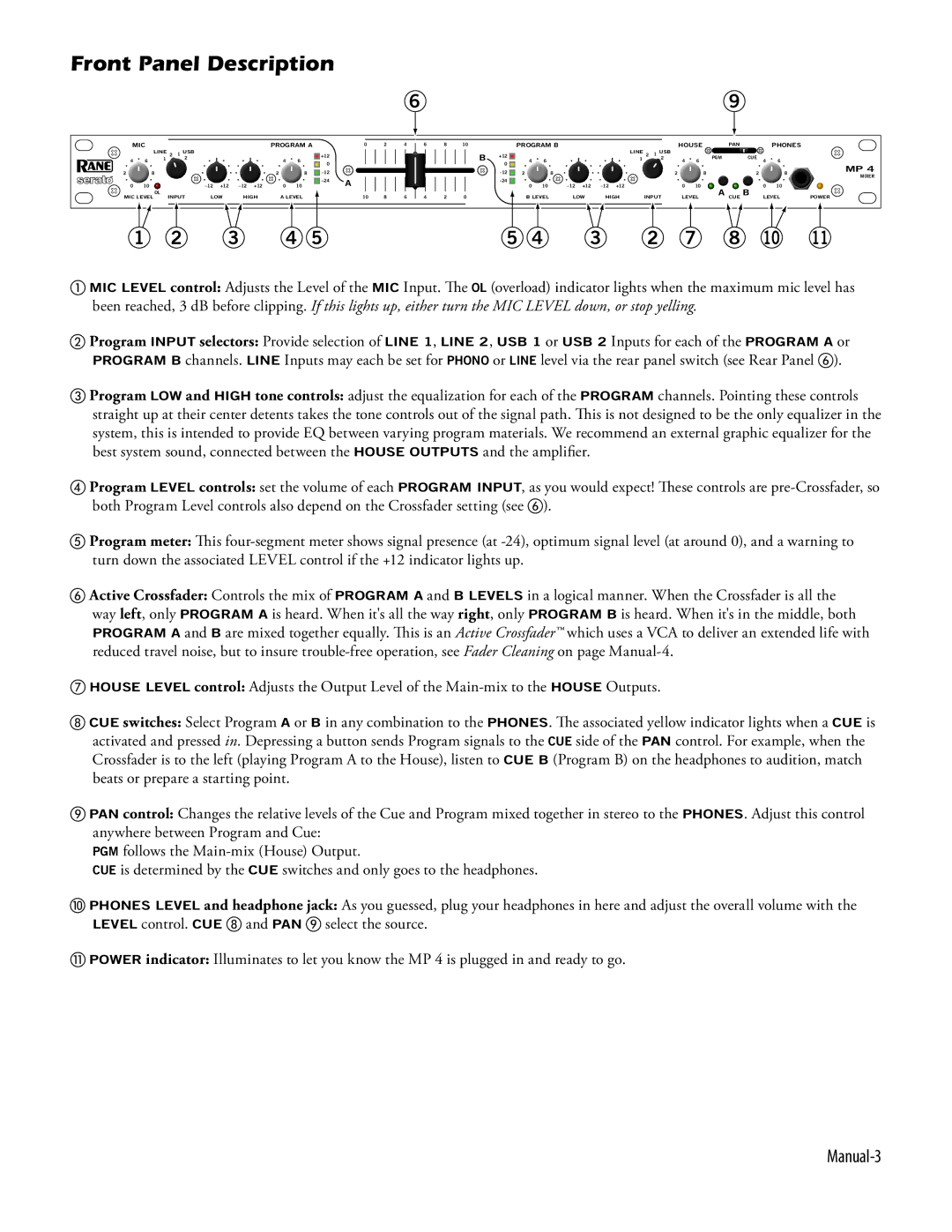
Front Panel Description
|
|
|
|
|
|
|
|
|
|
|
| 6 |
|
|
|
|
|
|
|
|
|
|
|
|
| 9 |
|
|
|
MIC |
|
|
| PROGRAM A |
| 0 | 2 | 4 | 6 | 8 | 10 |
| PROGRAM B |
|
|
| HOUSE |
| PAN |
| PHONES |
| |||||||
| LINE 2 1 | USB |
|
|
|
| +12 |
|
|
|
|
|
| B | +12 |
|
|
|
| LINE 2 1 | USB |
|
| PGM | CUE |
|
|
| |
4 | 6 | 1 | 2 |
|
| 4 | 6 |
|
|
|
|
|
|
|
| 4 | 6 |
|
| 1 | 2 | 4 | 6 | 4 | 6 |
| |||
|
|
| 0 |
|
|
|
|
|
| 0 |
|
|
|
|
|
| |||||||||||||
|
|
|
|
|
|
|
|
|
|
|
|
|
|
|
|
|
|
|
|
|
|
|
|
|
|
| MP 4 | ||
2 | 8 |
|
|
| 2 |
| 8 |
|
|
|
|
|
|
| 2 |
| 8 |
|
| 2 |
| 8 |
| 2 |
| 8 | |||
|
|
|
|
|
|
|
|
|
|
|
|
|
|
|
|
| MIXER | ||||||||||||
|
|
|
|
|
|
|
| A |
|
|
|
|
|
|
|
|
|
|
|
|
|
|
|
|
|
| |||
0 | 10 |
|
| 0 10 |
|
|
|
|
|
| 0 | 10 |
|
| 0 | 10 |
|
| 0 | 10 |
| ||||||||
|
|
|
|
|
|
|
|
|
|
|
| A CUE B |
| ||||||||||||||||
MIC LEVEL OL | INPUT | LOW | HIGH | A LEVEL |
| 10 | 8 | 6 | 4 | 2 | 0 |
|
| B LEVEL | LOW | HIGH | INPUT | LEVEL | LEVEL | POWER | |||||||||
| 1 | 2 |
| 3 | 4 | 5 |
|
|
|
|
|
|
| 5 | 4 | 3 | 2 |
| 7 |
| 8 | 10 | 11 | ||||||
1 MIC LEVEL control: Adjusts the Level of the MIC Input. The OL (overload) indicator lights when the maximum mic level has been reached, 3 dB before clipping. If this lights up, either turn the MIC LEVEL down, or stop yelling.
2 Program INPUT selectors: Provide selection of LINE 1, LINE 2, USB 1 or USB 2 Inputs for each of the PROGRAM A or PROGRAM B channels. LINE Inputs may each be set for PHONO or LINE level via the rear panel switch (see Rear Panel 6).
3 Program LOW and HIGH tone controls: adjust the equalization for each of the PROGRAM channels. Pointing these controls straight up at their center detents takes the tone controls out of the signal path. This is not designed to be the only equalizer in the system, this is intended to provide EQ between varying program materials. We recommend an external graphic equalizer for the best system sound, connected between the HOUSE OUTPUTS and the amplifier.
4 Program LEVEL controls: set the volume of each PROGRAM INPUT, as you would expect! These controls are
5 Program meter: This
6 Active Crossfader: Controls the mix of PROGRAM A and B LEVELS in a logical manner. When the Crossfader is all the way left, only PROGRAM A is heard. When it's all the way right, only PROGRAM B is heard. When it's in the middle, both PROGRAM A and B are mixed together equally. This is an Active Crossfader™ which uses a VCA to deliver an extended life with reduced travel noise, but to insure
7 HOUSE LEVEL control: Adjusts the Output Level of the
8 CUE switches: Select Program A or B in any combination to the PHONES. The associated yellow indicator lights when a CUE is activated and pressed in. Depressing a button sends Program signals to the CUE side of the PAN control. For example, when the Crossfader is to the left (playing Program A to the House), listen to CUE B (Program B) on the headphones to audition, match beats or prepare a starting point.
9 PAN control: Changes the relative levels of the Cue and Program mixed together in stereo to the PHONES. Adjust this control anywhere between Program and Cue:
PGM follows the
CUE is determined by the CUE switches and only goes to the headphones.
0 PHONES LEVEL and headphone jack: As you guessed, plug your headphones in here and adjust the overall volume with the LEVEL control. CUE 8 and PAN 9 select the source.
Q POWER indicator: Illuminates to let you know the MP 4 is plugged in and ready to go.
